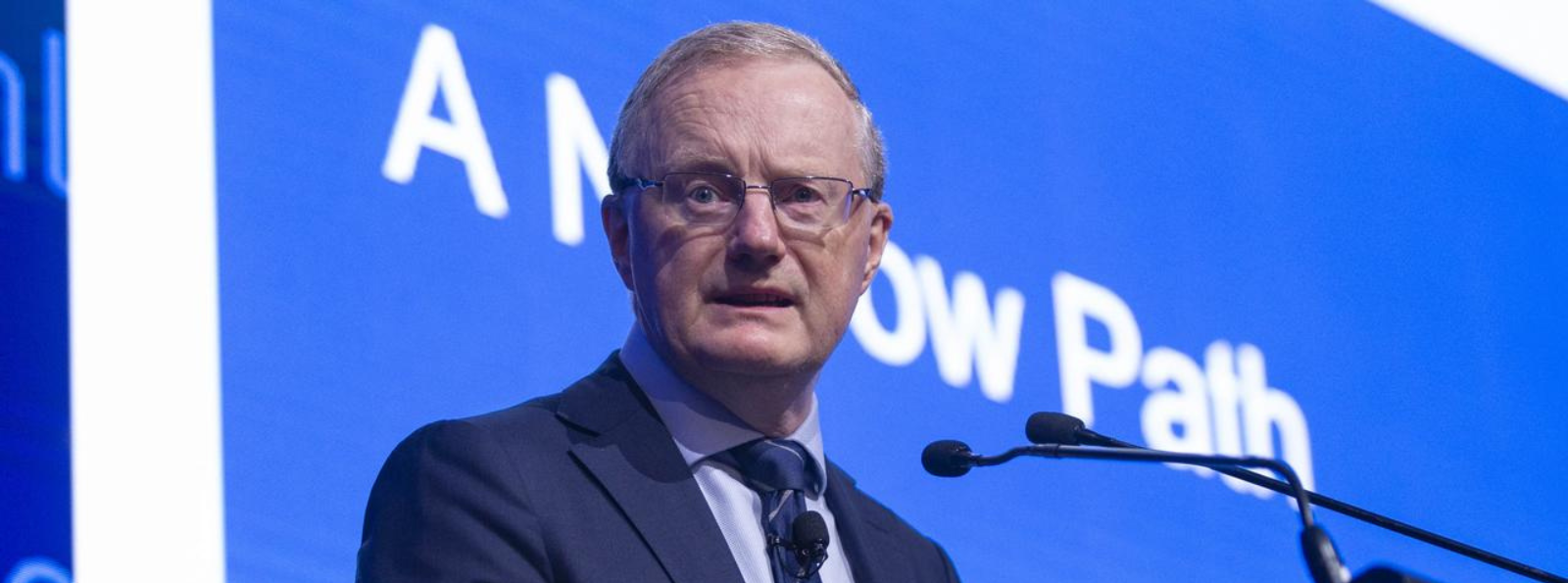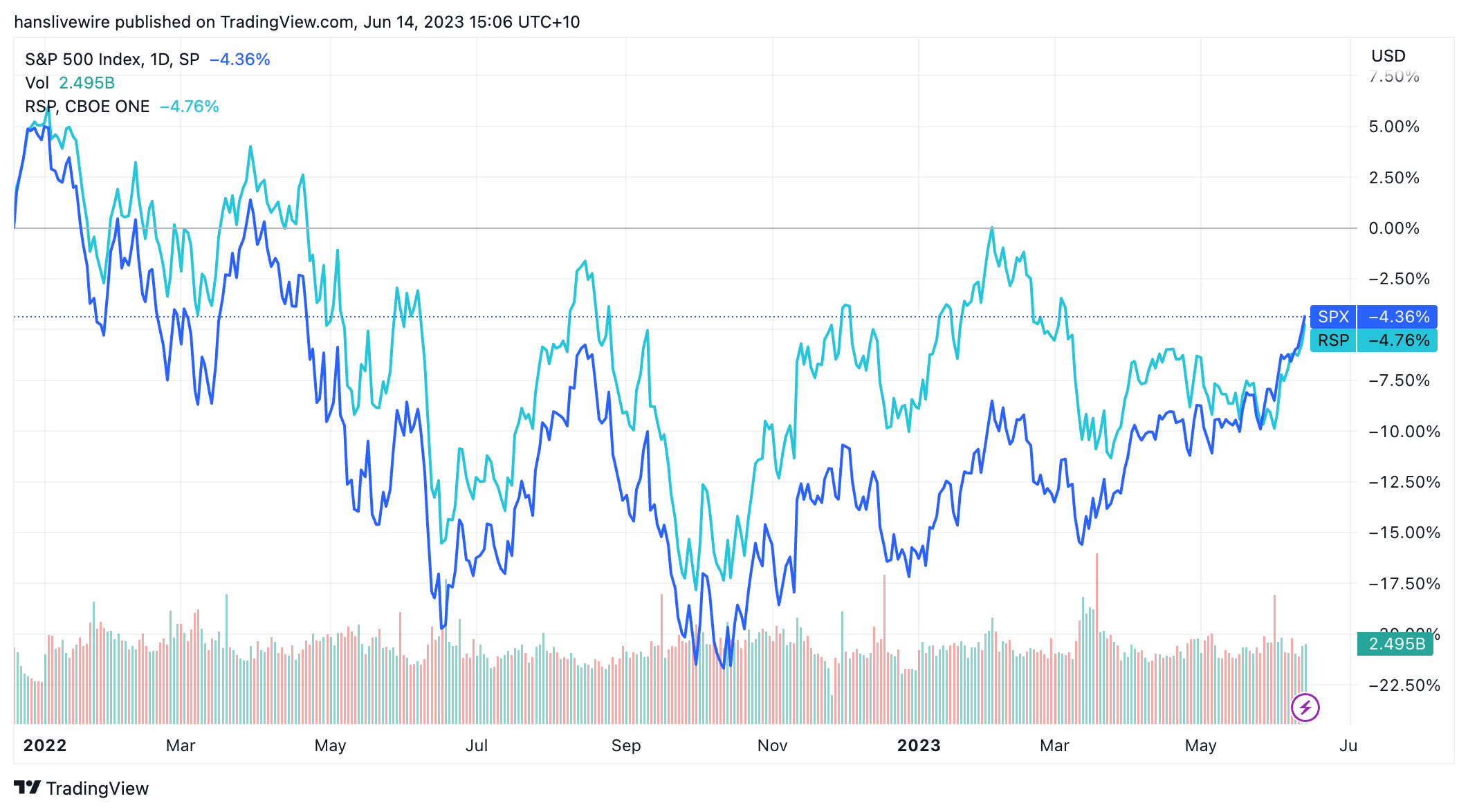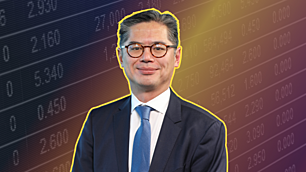Veteran investor Jonathan Pain's "perfect portfolio" for an Australian recession
In a career spanning 40 years, three continents, and a slew of well-known investment houses, you would think that Jonathan Pain has seen it all. Pain has been in the markets since before the 1987 market crash.
But there has also never been a global rate-hiking cycle quite like the one investors are going through right now. As this Bloomberg chart shows, interest rates have never been increased so quickly, dramatically, and with so much hawkishness and synchronicity.

And in the list of adjectives I've just mentioned, none are more important to Pain than 'hawkishness'. He says central bankers are intent on keeping interest rates higher for longer and fears that there is a risk of policymakers becoming too hawkish at the wrong time.
"I'm afraid we have a lot of interest rate and monetary pain ahead. Heaven forbid, if the RBA gets to a cash rate about 5%, we'd have an economic catastrophe," he said.
Since he finished up in funds management, Pain has written a weekly email widely read by the Australian market in addition to running his own consulting business and appearing at financial conferences.
He rarely conducts interviews anymore because - as he puts it - "I tend to hide away now." But as a treat, Pain sat down for an hour-long conversation with me to discuss the state of markets and what he is watching most closely. This wire features a selection of the best parts of that conversation.
But first... a little about Jonathan Pain
Pain was born in apartheid-era South Africa and went to school at the multi-ethnic Waterford college in Swaziland. From there, he went onto study in the UK - first, completing a degree at Keele University and later, a Masters at the University of Exeter.
In 1984, he became a Portfolio Manager at the US-domiciled Hanover Manufacturers. From there, he worked at Bahrain's Gulf Investment Bank and Paribas Asset Management.
He emigrated to Australia in 1997 where he was appointed CIO at Rothschild Asset Management. In 2002, he became a consultant for Hedge Funds Australia (HFA) Asset Management - which is also when he started writing The Pain Report. 21 years later, that newsletter is still going strong and is delivered every Saturday.
From dove to hawk
Pain's weekly note always starts with something that's been happening in the news. The inspiration for this conversation stemmed from Reserve Bank of Australia Governor Phil Lowe's address at the Morgan Stanley Australia Summit in Sydney last week.
%20(1600%20%C3%97%20595%20px).png)
Three months ago, the RBA Board issued a conditional pause on its rate hiking plans arguing that they needed to see more data come in before dealing out more hikes. By last week, the Governor had essentially flipped.
"There is a limit to how long inflation can stay above the target band. The longer it stays there, the greater the risk that inflation expectations adjust and the harder, and more costly, it will be to get inflation back to target," Lowe said in his prepared remarks.
Pain viewed the shift in commentary as a surprise and the confirmation of something much more important.
"Australia is experiencing massive and historic interest rate shock because we have very high levels of debt," Pain said.
"Central banks are clearly very intent to maintain rates higher for longer than many in the market had previously anticipated," he added.
Following the speech, two research houses (Goldman Sachs and Capital Economics) ramped up their terminal rate forecasts to 4.85%. The latter went one better, arguing the last rate hike will push Australia into a recession.
"Never before have we seen central banks respond so aggressively and with such a high degree of synchronisation," Pain added. "I can't recall all of the major banks ever moving with such purpose and with such speed."
"It is different this time."
%20(1600%20%C3%97%20595%20px)%20(1).png)
So is this time different? Those who have uttered those words often find that it does not age well. But Pain is adamant that something will break this time.
"It is different this time," he said. "Not only do we have a seismic interest rate shock and the impact of this very seismic rise in interest rates is still yet to take effect," Pain added.
Pain also hastens to add that the massive rise in interest rates is also happening alongside something that is relatively unprecedented - quantitative tightening. While the reduction in money supply is passive in Australia, it is active in other jurisdictions like the US and Europe. And as is the case with many things in markets, a lack of liquidity doesn't tend to portend good things for risk assets.
"Australia is heading toward recession, driven by a meaningful decline in household spending and a seismic rise in interest rates. It's a horrible conclusion to reach but I have no other alternative," he predicted.
But in one way, Pain argues 2023 is not that different from another time - 2008.
"The US banking system is in trouble and I know that whenever you make a comment like that, everyone says "it's not like 2008!" - and no it's not but it's just different," he argued.
"I think people should put much more emphasis on the credit contraction which is now inevitable," Pain added. "If you combine much, much higher levels of debt with the most painful and sudden interest rate shock that we are currently experiencing, by definition, the economic consequence will be greater than 2008."
Pain's S&P 500 Target
Pain has had an S&P 500 target of just 3,000 since November 2021. That's below even the most bearish of the Wall Street analysts (Michael Kantrowitz at Piper Sandler has a target of 3,225). To hear him explain how he arrived at that figure appears very simple - an S&P 500 EPS of $200 multiplied by a P/E multiple of 15 gives you 3,000.
"Six weeks after I came out with that target, a couple of analysts at some of Wall Street's largest institutions came out with the same target," he said. "That was very frustrating for someone like myself!"

As of writing, the S&P 500 is at 4,370. So what did Pain get wrong?
"My $200 EPS forecast for calendar 2023 is not going to be far off the mark. What I've got wrong is the price-earnings multiple because right now, the S&P 500 P/E multiple is around 21 times," he admitted.
And this is where he issues a small but important mea culpa:
"I am willing to concede that the market heavyweights are continuing to generate impressive earnings. Furthermore, when I made the forecasts above, I was not thinking about AI and the Nvidia effect," he added in the most recent report he issued to subscribers last week.
His "perfect" portfolio
With the kind of a backdrop he is setting up, it should be no surprise to you that Pain has great interest in the long-duration government bonds space. That is, investing in high-quality, long term public debt.
"As recession bites, you're going to see investors looking for safety and security," he said. "Government bond markets in Australia and the United States should perform reasonably well. I've consistently told my subscribers and consulting clients that whenever you see a 4% yield on Australian government bonds or US government bonds, that you buy them. That's my buy zone," he added.
The other classic hiding place is gold, which also happens to be Pain's other hiding place of choice. Beyond a recession and geopolitical tension, Pain points out gold could have a long bull run for a third reason.
"Many countries like Russia and China are looking to create a less-US Dollar dependent world, and they are very significant buyers of gold," he said.
What you may be surprised to hear is that Pain's perfect portfolio also has a couple of well-known growth names in it.
"Curiously, I've got this perfect portfolio which includes a little bit of NVIDIA (NASDAQ: NVDA) and Microsoft (NASDAQ: MSFT) because of the AI element," Pain said. "I have a very conservative view on all financial assets moving forward."
What's not in his perfect portfolio
Three months ago, the whole world was glued to the US to see which, if any, financial institutions were going to fall. Three eventually did alongside UBS buying out Credit Suisse. Pain is quick to emphasise that he does not see something that apocalyptic happening to any of the major Wall Street banks (the so-called "too big to fail" group) or indeed, the Big Five Australian banks. But nonetheless, he doesn't see much good coming for Australian financial institution stocks.
"The performance of Australian banks can no longer be ignored, and I don’t see what might turn it around in the next 6-12 months," he said. "They have pressures on every front and if we go into a recession, they will see a pick up in defaults and I do not see them experiencing significant loan growth moving ahead. Quite the reverse, in fact," he added.
He's not too thrilled with the resources and materials sector of our local market either.
"The Chinese economy is facing very significant headwinds in the next two to three years," he noted. "Furthermore, business and consumer confidence is in the basement at the moment. For Australia, we're a massive exporter of iron ore so there are also some global headwinds that will also influence us."
So what would make Pain turn bullish?
To close our conversation, I asked Pain if there was anything that would make him become a buyer of risk assets again. Here's how he responded.
"First of all, we have to have a cleansing of the system. When you've got this massive increase in interest rates, all the zombie companies will effectively have to be cleaned out. Zero interest rates combined with massive quantitative easing is Alice in Wonderland."
"The pathway out of Alice in Wonderland is into a new reality that is more normal and to get there, I think we'll suffer economic pain and households in particular will have to adjust their spending habits and that means much slower growth."
He also has an interest in the long-term story of some emerging markets and the positives to come from it.
"I'm positive on India, very positive on Vietnam, and Indonesia. These are the countries where we will look to in order to provide us with a tailwind as we come through this period," he said.
Jonathan has contributed to some stories I have done in the past. One of them was about the UK mini-Budget which saw Liz Truss and Kwasi Kwarteng's leadership come to a swift end. You can read all about that here.
%20(2).png)
For more on the India, Vietnam, and Indonesia stories, you can watch my recent conversation with Dr Joseph Lai of Ox Capital Management.

2 topics
2 stocks mentioned

